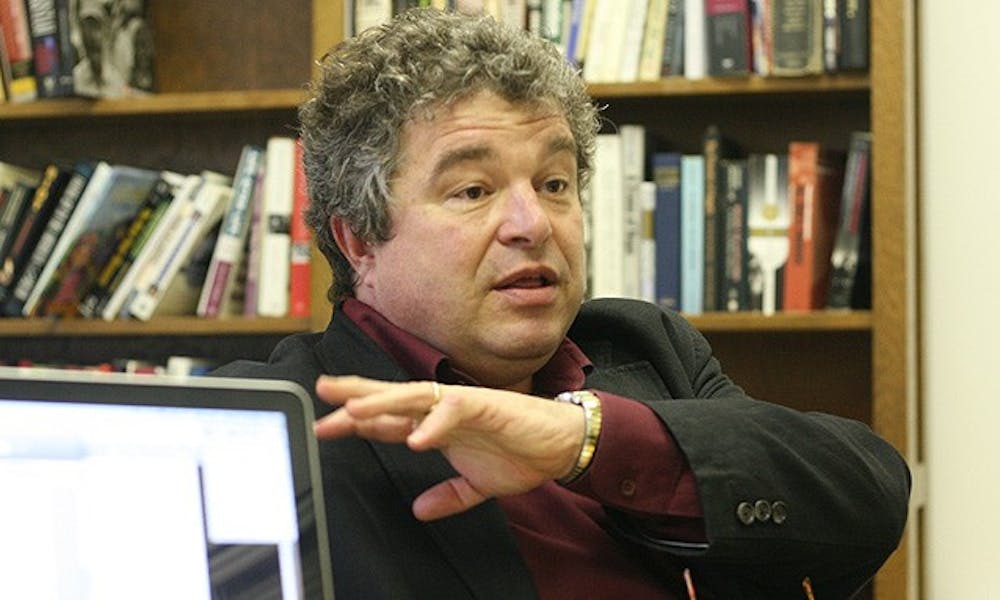Historian and activist Tim Tyson, senior research scholar at the Center for Documentary Studies, is an outspoken critic of Wake County School Board’s “neighborhood schools” concept, which keeps students closer to home but eliminates the nationally recognized busing policy that promoted diversity in the school system. Discontinuing the busing saves the county money, but critics like Tyson argue the measure will effectively resegregate the schools. Tyson protested against the measure in June at a Wake County School Board meeting and was arrested after refusing to turn over the podium to board members. The Chronicle’s Yeshwanth Kandimalla sat down with Tyson to discuss the implications of the policy and his activism efforts.
The Chronicle: You are a strong believer in the value of socioeconomic diversity in schools. Why are you advocating for it so passionately?
Timothy Tyson: Studies have shown that poor children in middle-class majority schools learn twice as much and achieve more. It doesn’t hurt middle-class kids, and [middle-class students] get a broader experience. The most important resource for any school is the other children.... Socioeconomic diversity is not a magical answer, but it is an important step.... It’s no coincidence that the 20 most depressed urban areas are also home to the 20 most racially segregated school districts.... It’s not some radical fringe that supports socioeconomic diversity. It’s the radical fringe that has captured the Wake Board of Education.
TC: What are the beliefs of the proponents of neighborhood schools?
TT: At first, none of these people expressed any concern about poor and minority schoolchildren. Now they say [poor, minority students] don’t perform as well as they should, that the achievement gap is too high and the diversity policy is a failure. First, it’s a lot of phony arithmetic.... Second, the inadequacy of their logic is obvious... Resegregation cannot be presented as a solution to [the achievement gap]. The fact is [that] Wake County, with fairly modest expenditures, has created one of the best urban school systems in the country.
TC: What role does politics play in all of this? Is there a partisan element to this opposition?
TT: Yes. This movement is frankly the product of conservative Republican hacks. National conservative money has poured into Wake County. We’re talking about Americans for Prosperity, the group that funds the Tea Party. They are just pushing this for partisan political advantage. Obama punched a great big hole in the South when he won North Carolina [in 2008]... and they want their state back. The largest donor to the neighborhood schools movement is Robert Luddy [a businessman and founder of Thales Academy in Wake County]. He is literally invested in the failure of the public schools. At its core it’s an ideological issue, and many in the opposition believe that public education is fundamentally a mistake.
TC: Protest has played a major role in your activism. What role does protest play in your ideas about civic engagement?
TT: Public discussion is at the heart of a democratic culture, and we’re part of a public discussion about public education. I was born in Raleigh in 1959. My father was a minister, and my mother taught at York Elementary School. My commitment reflects the extent to which my parents fought for integration. Schoolteachers like my mother, both black and white, were where the rubber hit the road when it came to integration. In my first historical research as a scholar, I interviewed dozens of older African-Americans in Raleigh. They had grown up under the bitter oppression of Jim Crow. Thinking about what they had lived through and what they worked for really drives my commitment.
TC: What do you think about the status of Durham Public Schools?
TT: Durham’s schools are a mixed bag of a cautionary tale and a tribute to persistence. The county resisted integration longer and began the game at a disadvantage. By the time Durham merged city and county schools, the city schools were 91 percent black. Durham isn’t a disaster though—[socioeconomic diversity policy] just wasn’t done as effectively as in Raleigh. Durham has had generations of passionate activists and the civic engagement could hardly be higher.
TC: What is basis of the legal challenge mounted by the National Association for the Advancement of Colored People?
TT: The North Carolina NAACP filed a Title VI complaint with the [U.S. Department of Justice] for racial discrimination. [Our opponents] claim they haven’t done reassignment based on race. That’s just a lie. They changed the schools of 411 students. Four hundred of them were African-American. The new segregationists are attacking in Charlotte, Wilmington [and] all across the state. I’ll be damned if I stand idly and watch the destruction of what generations of North Carolinians sacrificed to achieve.
Get The Chronicle straight to your inbox
Signup for our weekly newsletter. Cancel at any time.

